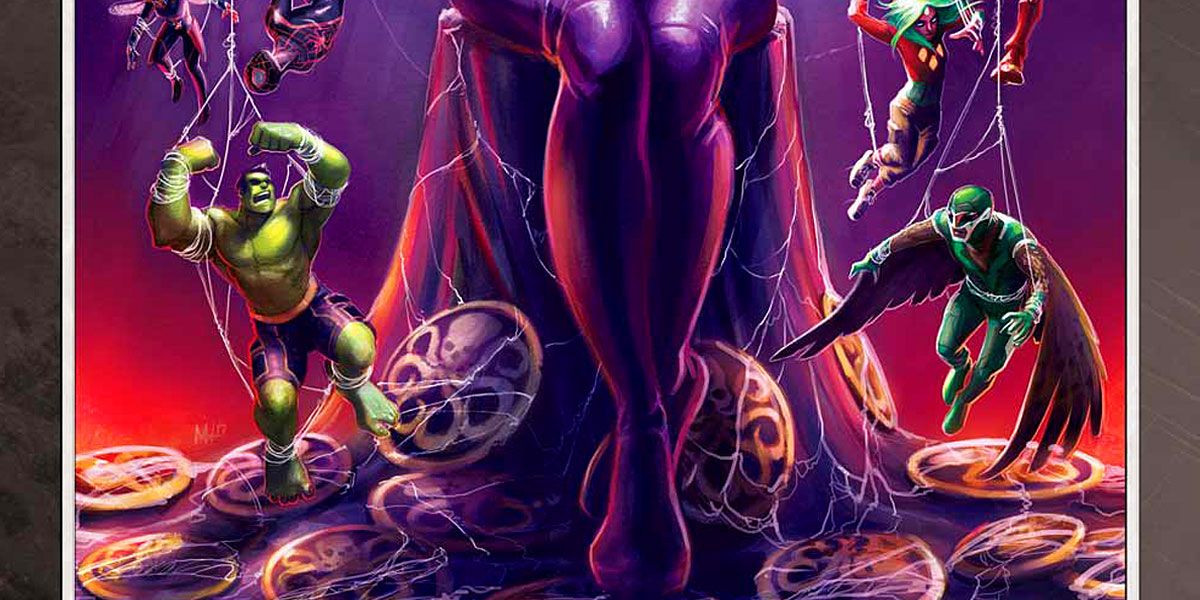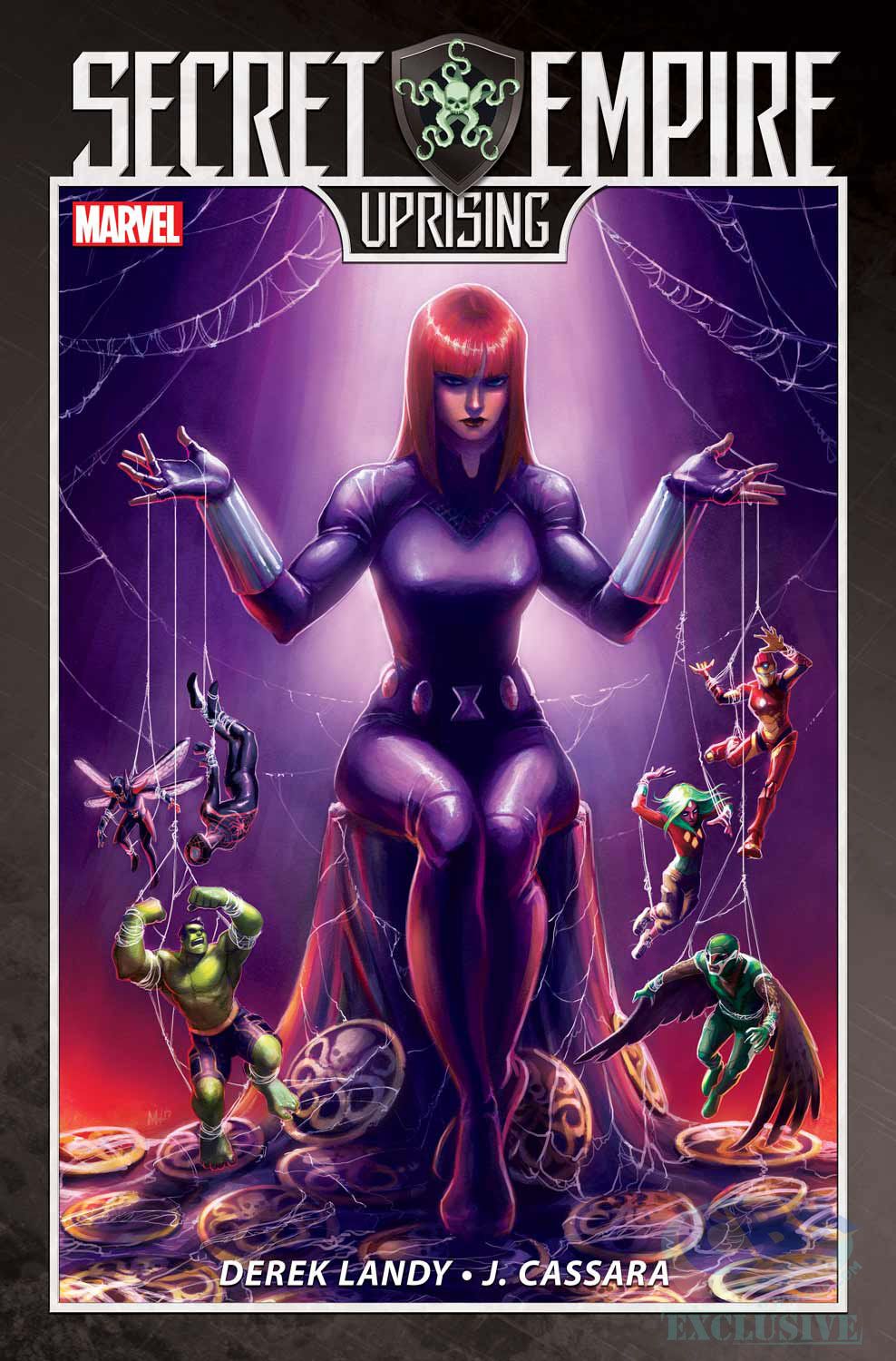Steve Rogers, the original Captain America, is one of the most respected heroes in the Marvel Universe. Recently, however, a cosmic entity altered his history, rewriting reality in such a way that he has now been a life-long deep cover agent for the terrorist organization known as Hydra.
Rogers has been using a combination of his respected reputation and devious cunning to quietly seize power, and when Marvel's “Secret Empire” event begins in May, he'll have turned the United States into a Hydra stronghold. As a result, the veteran heroes of the Marvel U will suddenly find themselves betrayed and under assault by the one man they trusted the most.
This June, Marvel's next generation of heroes will be thrust onto the front lines of the war against Steve Rogers and Hydra in “Secret Empire: Uprising,” a one-shot by writer of the blockbuster, award-winning "Skulduggery Pleasant" series, Derek Landy and artist J. Cassara, as the Black Widow drafts several of them for a special espionage mission. CBR spoke exclusively with Landy and his editor Alanna Smith about the pivotal tie-in, the heroes involved, the complicated dynamic between them and the Black Widow, and how the story is a crucial tie-in that bridges the gap between issues #3 and #4 of “Secret Empire.”
CBR: In “Secret Empire: Uprising,” you're telling a tale that occurs between issues #3 and #4 of the main series and involves the Black Widow and several of Marvel's new and younger heroes. What can you tell us about the central conflict?
Derek Landy: These characters are Marvel's new generation. For some of these characters, this will be the first time they take part in one of Marvel's events. And most of them are pretty new to the superhero game. So to suddenly be standing side by side with the heroes that they had grown up with and toe-to-toe against the biggest hero of all is a rude introduction to the world of Marvel big events.
They are really in the deep end here and they're given an assignment that's the complete opposite of the espionage, spy work, and black ops they're expecting because they're being trained by the master of all those disciplines, the Black Widow. So essentially they have to take what she's teaching them and apply it to a most unusual situation where they don't quite get to be as cool as James Bond, but they struggle on.
It's philosophical, with jokes and punching, [Laughs] which I think is always the best kind of story. The wonderful thing about “Secret Empire” is how scary it is. It's a terrifying proposal. The danger is losing sight of the fun of these characters and their attitudes. As a writer, you've got to be able to make their personalities shine through, and all of these kids are funny. All of them have a certain kind of attitude. And all of them are very intelligent.
So within this nightmarish scenario, you have to let their senses of humor and vulnerabilities shine through. Because essentially they are a bunch of teenagers who are scared of being suddenly out of their depth.
How connected is this one-shot to the larger “Secret Empire” story?
Alanna Smith: The way we're building the one-shots for “Secret Empire” is that these are integral to the main story. So when you read “Secret Empire” #3, you'll see the jumping off point where “Uprising” starts. You can go right from #3 to “Uprising,” and then “Uprising” tees up events that will happen later in the series. It's really a critical part of reading this event.
Your cast includes the young Spider-Man, Miles Morales; the new Falcon, Joaquin Torres; the Totally Awesome Hulk, Amadeus Cho; Riri Williams AKA Ironheart; the Unstoppable Wasp, Nadia Pym, and the Vision's daughter, Viv. Which of these characters and the dynamics between them have proven to be especially enjoyable to write?
Landy: Before this, I had only written one six-page story for Marvel [In “Civil War II: Choosing Sides” #3]. That starred J. Jonah Jameson, so straight off I got to work with one of the iconic characters of the Spider-Man books. To go from that to this 30-page issue starring basically the most exciting characters at Marvel, this diverse group that have had the mantles of older characters passed on to them, is startlingly fun.
For the dynamic in this story we're putting them all together in a high pressure scenario. We're surrounding them with bad guys and letting them off the leash.
What's your sense of the kids' mentor figure in this story, the Black Widow?
Landy: A lot of these heroes that are finding themselves on the opposite side of Captain America have to ask awkward questions of themselves and answer them. Natasha is conflicted as are most, if not all, of the older characters. Because they know Cap. They've been around him forever.
Natasha is determined and grim in this story. She doesn't want to do this, and yet, she's probably one of the only people who can.
Is this the first time Natasha and Nadia Pym, who is also a veteran of the notorious Red Room program, will meet?
Smith: I believe it is. I don't believe in the current “Black Widow” series that Natasha has found out about Nadia yet. So this is the first time that they'll be in contact where they know about each other and that they come from the same place. That is touched on in the story. The kind of training that Natasha is giving is the kind that Nadia basically fled.
The conflict for her is what is she willing to do? She's run away and gotten a new life. Then this horrible event happens and she has to deal with getting pulled back in. That becomes part of the conflict.
Landy: The dynamic between them is strained. [Laughs] If this meeting had happened at any other time than this event it would have gone completely different.
In “Uprising,” Natasha is humorless because she's just realized this job needs to be done. Then, up against her you have Nadia, who is a beacon of light. She's lovely, warm, funny, curious and optimistic. To put Nadia's light up against the grayness of Natasha is a definite contrast. And, as I said, any other time of the year you'd probably get a different interaction, but you would get different interactions between Natasha and any of our characters.
Earlier you mentioned this would be a story with punching. So who are some of the bad guys that will get punched in “Uprising?”
Landy: [Laughs] A lot of Hydra jaws get smashed -- that's an unfortunate side effect of joining Hydra. I also get to play with a new group of mercenary villains called the Freelancers who have appeared in “Champions.”
The Freelancers are fun, and they're different from what I was expecting when I first heard about them. I thought they would just be a gang of young villains. They have an extra dimension, though, that I wasn't really expecting. Bringing them into “Uprising” added layers.
If you have villains who are layered, it's naturally going to add something to the story. So you have the masked, uniformed soldiers of Hydra and then you have the Freelancers who are almost a bit iffy about this whole thing. They're doing this job because they're getting paid for it, but do they really subscribe to the Hydra ethos? No.
You're working with J. Cassara on “Uprising,” who is an artist that's especially great with expression, action and setting eerie and dire tones. What do you enjoy most about Josh's art?
Landy: He sent me the first few pages of pencils, and it's a thrill to see how he's interpreting everything. His line work is clear and concise, and one thing I noticed is he doesn't do anything ordinary.
I'll give him what, on a keyboard, would sound like a flat panel, and he would just pop, twist, and flip it. Even in scenes that were just strictly dialogue, the characters would leap off the page. So it's very clean and very pretty.
I love dialogue. That's where my strength lies, but Josh is the kind of artist where you look at a few pages of his pencils and you go, “I don't mind taking out this speech balloon. I don't mind that panel being completely silent.” I let him tell the story and it's a lovely confidence booster. I know the story is in good hands. So I can actually write less.
“Secret Empire: Uprising” is your second project for Marvel, and it's your second event story too. Is that just coincidence? Or is there something about event stories that you find especially appealing?
Landy: Because there are so many one-shots and spin-offs that fill in the gaps I think events for Marvel are a wonderful way to essentially test out new writers in a trial by fire. So you either succeed or you burn.
So I'm happy. I get to write the new Spider-Man! I get to write the Totally Awesome Hulk! I would write whatever Marvel suggests! [Laughs]
Finally, “Uprising” will likely be some readers first exposure to your writing. So some might be curious about the work you've done as a prose writer. What would you like them to know about the book series you've written like “Skulduggery Pleasant” and “Demon Road?”
Landy: I'm a fan of everything I write about. So I'm unashamed of my influences, and my books are a crazy mishmash of genres; science fiction, fantasy, horror and comedy. But the influence of comic books has always been there in my work.
I've just come off a book tour, and for two weeks I've been telling kids that Spider-Man taught me to read. It was because of Spider-Man that my reading level was so far ahead of my classmates, and the thing about Marvel's heroes is they're given incredible powers and gifts. That's not the only thing they're given though. They're also given problems, insecurities, and every kind of weakness you could possibly imagine. So when it comes to creating and writing characters that's how I approach it. I approach it in the Marvel way, the Spider-Man way, the Indiana Jones way, where a character can do amazing things and yet they're riddled with issues and problems.
Plus, in the middle of the fight they'll be punning and wisecracking, which has always been an absolute favorite of mine. And finally! I get the chance to have Spider-Man tell jokes as he fights. It happens here and it's been a dream come true.


